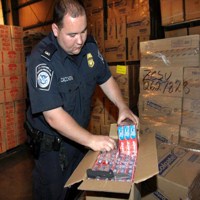Globalization is predominantly thought of as a benign force offering greater opportunities for trade, communication and technological innovation. Yet globalization has developed a dark side, exploited by malicious actors like drug and human traffickers, terrorists and WMD proliferators. Globalization has done more than just provide these actors tools for conducting their trade; it has created an entirely new breed of crime, where illicit activities converge and the drug trafficker may also be the terrorist or the proliferator, or both.
One recent example of this growing confluence of transnational security threats is Panama’s recent seizure of the North Korean cargo ship Chong Chon Gang. Authorities stopped and boarded the ship in the Panama Canal, finding smuggled components of fighter jets and surface-to-air missiles from Cuba bound for North Korea. This is not the first time officials seized the Chong Chon Gang: It was also detained in Ukraine in 2010 for smuggling small arms and narcotics.
Knowing what we know about trafficking networks, it is not farfetched to suspect that the Chong Chon Gang may have also been a vehicle for human trafficking, as well as for smuggling counterfeit goods and even materials for nuclear, biological and chemical weapons. Such is the nature of illicit activity in a globalized world.

